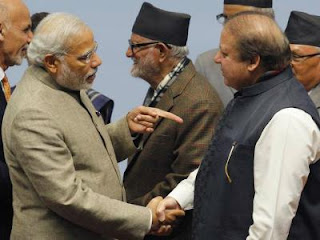Indus Water Treaty, MFN status, and armed
action –India’s multi-pronged response to Pakistan after the Uri incident
.Friends a lighter view on this and how it affects? Is the time really come to
review the Indus Water treaty and take all these actions?
First, the Indus Water Treaty
(IWT) is a water sharing arrangement which was signed in Karachi on
September 1960 by then Prime Minister Jawahar Lal Nehru and Pakistan’s
President General Ayub Khan. The World Bank brokered the treaty and is also a
party to it. There is no doubt that Pakistan’s economy, lives of its citizens
and their livelihoods are intricately linked to the western rivers of Indus, Jhelum, and Chenab
while India has the eastern rivers of
Ravi, Beas, and Sutlej. Regulating the waters of these rivers and their
tributaries can create huge problems for Pakistan. The Indus river system
distributes about 175 billion cubic meters of water to Pakistan of which over
70% is used for irrigation of farming land. This irrigated land produces about
90% of Pakistan’s food grains and contributes about one –fourth of nation’s
GDP. Not just agriculture the Indus water also provides employment to almost
45% of Pakistan’s labor force and supports, directly or indirectly,
three-fourth of the country’s more than 60% revenue in foreign exchange
earnings to Pakistan’s national income.Click here to know about Psychology round of SSB
Also read: Best way to prepare for SSB
Second MFN status: After the incident, there were speculations that the Indian government was planning to withdraw the Most Favoured Nation (MFN) status from Pakistan.
According to the MFN principle of the WTO’S General Agreement on Tariffs and Trade (GATT) to which India is a signatory/contracting party, each of the WTO member countries (including India and Pakistan in this case), should “treat all the other members equally as ‘most –favoured trading partners”. The Bilateral trade between the two nation is just $2.6 billion in 2015-16-which represented a minuscule 0.4% of India’s overall goods trade worth $643.3 billion in the same year. But if India actually takes this step it will lose its goodwill, both in the South Asian region and at WTO. India enjoys a trade surplus and is party to a free trade pact called SAFTA, which also includes Pakistan.
Rest the surgical strike that cleared India’s stand, I think there is no need to describe this .India will need to adopt a deterrent strategy for engaging Pakistan by leveraging its diplomatic and economic strength without blurring the distinction between the deep state and the civil society of Pakistan and most importantly, without falling to the temptation of public posturing.
We still need to think why these
steps needs to be taken and is this really essential to take them against
Pakistan. Though Pakistan had done many odds against our nation but are these
things the only solution? Our Government is trying at all the levels to prove things
against Pakistan and we have seen pretty good results but still one says to
have good relations with the neighbour. I would like to hear from you all. What
do you think is appropriate? Comment here and let’s have a discussion.
About the
Author:
Snehil is a Mechanical engineer working with a
renowned bank. He is a great sportsman and enthusiast who has played almost
all the sports. He loves reading blogs and want to serve the nation.
|



I think the surgical strike was the good answer to them against Uri attack and cross border activities carried out by the their army. But at the same time reviewing the treaties will affect the normal people in their region. we are not in humans like their decision makers who are not concerned about humanity. It was a good tit for tat response that has shocked them to a good extent.
ReplyDeleterightly pointed out.
Delete